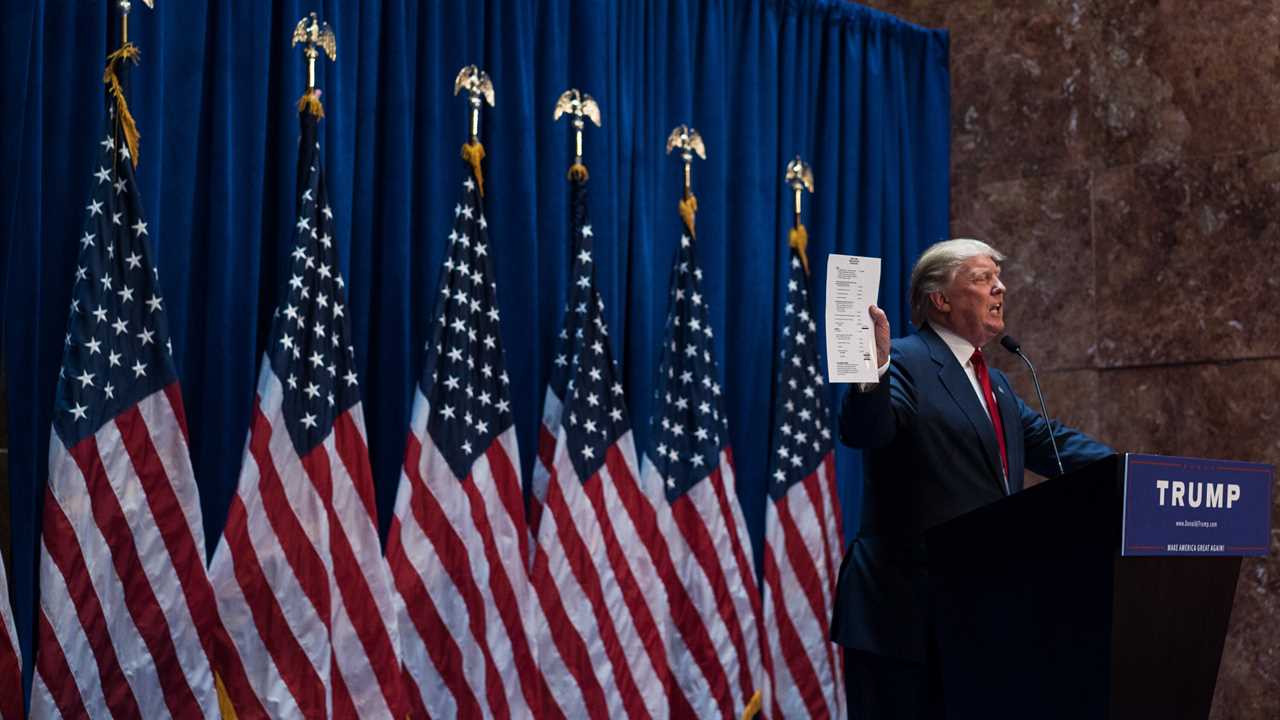
On Tuesday evening, former President Donald J. Trump, rattled by news that his longtime accountants had declared that years of his financial statements were not reliable, issued a statement of self-defense with new claims about his wealth.These, too, did not add up.In a rambling emailed message, Mr. Trump referred to a “June 30, 2014 Statement of Financial Condition” prepared by the accounting firm, Mazars USA, showing that the year before his first presidential run his net worth had been $5.8 billion. But that is not what he said back then.When he declared his candidacy in 2015, he produced what he called his “Summary of Net Worth as of June 30, 2014” with a very different number: $8.7 billion. A month later, he upped the ante, releasing a statement pronouncing that his “net worth is in excess of TEN BILLION DOLLARS.”The shape-shifting valuations, even in the face of mounting legal peril with Mazars’ decision to sever ties and disavow its past financial statements, get to the core of a problem for Mr. Trump. He has spent a lifetime bending reality to his will, often making it up as he went along, inventing facts and figures to support his needs in the moment. In fact, in his Tuesday email he suggested the intangible value of the “Trump brand” was actually worth an extra $3 billion in 2014.“My net worth fluctuates, and it goes up and down with markets and with attitudes and with feelings, even my own feelings,” he testified in 2007 as part of his unsuccessful lawsuit over a book that suggested he was not really a billionaire.Now, though, he faces multiple investigations that threaten to hold his questionable claims up to the light. In New York, two law enforcement inquiries are examining whether he fraudulently submitted overblown real estate valuations to secure loans. And in Georgia, a grand jury is looking into Mr. Trump’s attempts to pressure state officials to “find 11,780 votes” — his margin of defeat in 2020 in that battleground state — that he baselessly asserted had been stolen from him.For Mr. Trump, such casual dalliances with inaccuracies and lies have long been central to his modus operandi, which he once famously described as “truthful hyperbole.” He has employed this “very effective form of promotion,” as he called it, to sell himself and build the brand that ultimately helped vault him to the White House.Along the way, his puffery often came with unfortunate consequences for average people who could not distinguish truth from hyperbole. Yet for the most part, he avoided serious legal consequences, sometimes by paying to end lawsuits and, in at least one instance, stifle a criminal investigation.After the success of the television show “The Apprentice” helped make Mr. Trump a household name in the early 2000s, he parlayed it into an ever-expanding assortment of branded products and services, from cologne and neckties to steaks and cellphone ringtones. There were promotional deals that generated millions of dollars for him, but also lawsuits that made what came to be a familiar argument: that Mr. Trump’s hyperbole misled clients into losing money in various ways.He lent his name to the multilevel marketing of vitamins, pitching it as “an exciting plan to opt out of the recession,” and sold unaccredited real estate seminars through his for-profit Trump University. The company behind the vitamin scheme soon went bankrupt, and people who paid as much as $35,000 for the seminars sued, claiming they were worthless, eventually resulting in a $25 million settlement as Mr. Trump was about to enter the White House.ImageMr. Trump sold unaccredited real estate seminars through his for-profit Trump University.Credit...Bebeto Matthews/Associated PressBuyers of condominium units in Trump-branded projects in Mexico and Florida alleged that they had been duped into thinking Mr. Trump had an active role in them, when in fact he had merely licensed his name. And in New York, people who bought units in the Trump SoHo development in Lower Manhattan claimed in court that Mr. Trump and his family had overstated the number of sales in the luxury building, damaging their investments.Mr. Trump quietly settled that suit in 2011 — but on the condition that the plaintiffs notify criminal prosecutors looking into the exaggerated marketing of units that they no longer wished to cooperate. The criminal investigation, by the Manhattan district attorney’s office, was eventually dropped.The current investigations in New York have proven a tougher challenge. The inquiry by the state attorney general, Letitia James, has obtained voluminous records covering years of financial transactions, documenting what appear to be misleading assertions by Mr. Trump or his representatives.Among other things, according to court filings, Mr. Trump By: Mike McIntire
Title: For Trump, a Perilous Exclamation Point to Years of Wealth Inflation
Sourced From: www.nytimes.com/2022/02/16/business/trump-wealth-mazars.html
Published Date: Thu, 17 Feb 2022 01:29:24 +0000
Read More
 UK PoliticsWorld PoliticsVideosPrivacy PolicyTerms And Conditions
UK PoliticsWorld PoliticsVideosPrivacy PolicyTerms And Conditions
